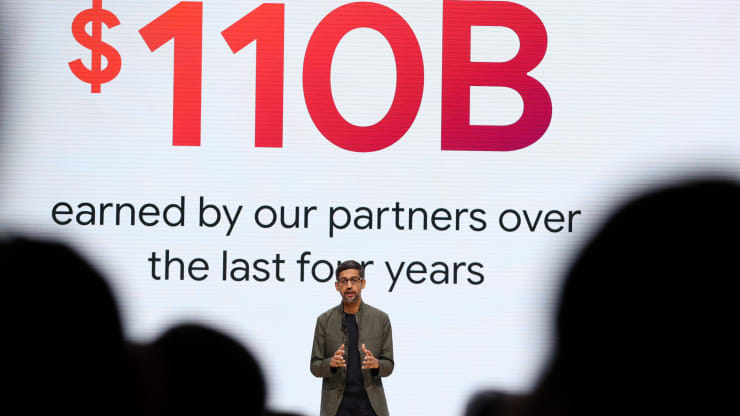- The antitrust investigation into Google brought by 50 state attorneys general on Monday will focus on Google’s advertising business.
- As they look to better understand how the ads business works, leaders are asking for more information on Google’s acquisitions, data collection policies, pricing models and more, according to a Bloomberg report.
- Travel and job search may be other areas of scrutiny, since Google has its own products in those areas that compete with other businesses.
The state attorneys general investigating Google want to take a much deeper look into the tech giant’s advertising practices.
Texas Attorney General Ken Paxton — who is leading the new antitrust probe by state attorneys general from 48 states, the District of Columbia and Puerto Rico — said the investigation will focus on Google’s advertising business, “but the facts will lead where the facts lead.” At a press conference Monday, attorneys general emphasized Google’s dominance in the ad market and use of consumer data.
Then Bloomberg reported Tuesday that more specifically an “investigative demand” was issued by officials seeking information about Google’s acquisitions of advertising technology companies such as DoubleClick, its data collection practices, pricing models and more.
Google’s ads business is sprawling. According to eMarketer, Google will reach a milestone of surpassing 20% of all U.S. ad spending both online and offline this year. Google captures 74.6% of U.S. search ad spending. And the company is expected to lead the U.S. digital ad market with a 37.2% share, totaling $48.05 billion this year. Facebook is second with a 22.1% share, eMarketer said.
Jason Kint, CEO of Digital Content Next, a trade association for digital content companies (including CNBC and parent company NBCUniversal), said he’s heartened to see regulators at the state level and in other nations focusing on some of the same concerns. He said regulators are displaying a more advanced understanding of Google’s business and how the company plays such a substantial role on the buy side, on the sell side and in the auctioning of ads.
“I think regulators are more prepared to understand why some of these issues are problematic,” he told CNBC.
Kint said regulators are starting to look at the fact that Google doesn’t have a real peer in technologies along the links of the digital media supply chain, such as those technologies that decide what to bid on ads or negotiate the transaction between the buy side and the sell side.
“They have the ability to see into the data throughout that entire supply chain,” he said.
The Bloomberg report said investigators want more information about Google policies, such as requiring companies wanting to advertise on one of its platforms to use its own services and whether customers complain about those requirements.
The investigation could veer into how Google has behaved in certain industries involved with the digital market. In the European Union, Google faces an investigation over claims it is driving competitors out of the market with its job-search tool. Google places its own widget at the top of job searches, which could prevent people from going to sites such as Monster.com or Indeed. One ad agency executive, who requested anonymity, added this kind of information is also valuable for Google to keep within its walls. “Google then gets a lot of intelligence about you if you’re really searching for a job,” he said.
The Bloomberg report said investigators are asking for information on how Google shares data with other companies and how it tracks behavioral data on its web browser, which it said could indicate an interest in privacy in addition to competition.
Another area that has drawn scrutiny is Google’s entry into travel bookings. Google tends to prioritize its own listings for travel searches, such as for flights or hotel rooms. Some travel search sites have struggled with what they claim are growing costs and dwindling return on demand of Google search.
In its second quarter earnings call, Tripadvisor’s CEO fielded questions about headwinds in the area of SEO, or search engine optimization.
“There is an effect of Google and other search engines moving more and more into the travel space and that’s a bit of a hotel headwind we called out,” CEO Steve Kaufer said on the call. He added later, “It is getting a lot harder due to Google pushing their own products. And, by the way, we think it’s entirely appropriate for regulators to be looking into this practice.”
Booking.com said on a recent earnings call it was facing similar troubles of declining ROI with performance marketing.
The investigation could also veer into what harm is created for consumers by the prioritization of certain information.
Yelp’s senior vice president of public policy, Luther Lowe, in a company blog post, pointed to an example of a mother doing a search for a pediatrician in Mountain View, California. “Instead of seeing the best information from across the web, Google steers her to its low quality ‘house’ products,” he wrote, citing a Wall Street Journal report that discussed ads in Google Maps leading consumers to false listings. “This form of self-serving bias causes direct harm to consumers at an incredible scale,” he wrote.
Experts say the investigation will likely take years. But Lowe said he believes it will yield real change.
“I can’t imagine a scenario where Alphabet doesn’t emerge from this as a completely different company whose conduct is heavily scrutinized,” he said. ”[It will] have to operate in a very different way.”
Asked for comment, Google pointed to a blog post from last week by its senior VP of global affairs, Kent Walker, titled “Google’s services create choice for consumers, and spur innovation in the U.S.” The post said the company has answered questions on Google’s services over many years, has “always worked constructively with regulators” and will continue doing so.
“We look forward to showing how we are investing in innovation, providing services that people want, and engaging in robust and fair competition,” it said.
